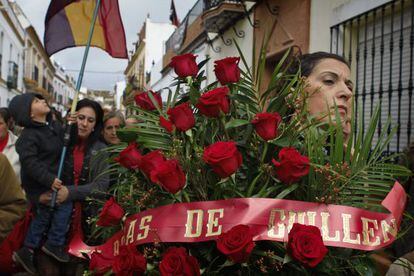Truth, justice and reparation
Bodies of 17 Republican women executed in the Spanish Civil War are finally brought home


The "17 Roses of Guillena" — a group of women from the same village who were assassinated during the Civil War because of their Republican connections — returned home on Saturday to receive proper burial after lying for 75 years in a mass grave.
Their tormenters jailed them, raped them, shaved their heads and marched them through town to be laughed at by their fellow villagers. After that, the Falangists loaded them onto a truck like a herd of cattle and drove them to the next town, Gerena, also in Seville province. In November 1937, these 17 women, aged between 24 and 70, were executed and their bodies dumped into a grave at the local cemetery.
They say that the only sounds coming from that truck as it drove into the annals of infamy were whimpers and cries of fear. But when their remains were driven back to Guillena, there was a deathly silence, broken only by the sound of church bells. Hundreds of residents made their way to the graveyard on Saturday. A plaque outside the pantheon where they now lie reads: "Truth, justice and reparation."
The symbolic ceremony was part of an ongoing movement to recover the bodies of Republican sympathizers who were summarily executed during Spain's Civil War (1936-1936) and the four decades of dictatorship that followed. While such cases have acquired some relevance through films such as 13 Roses, by far the most famous victim of the Nationalist repression was the playwright and poet Federico García Lorca, whose body has never been recovered.
They left Guillena spurned and humiliated; they returned like heroines, their dignity restored.
They left Guillena spurned and humiliated; they returned like heroines, their dignity restored. Two hearses carried 17 wooden coffins, 17 roses and 17 little signs bearing their names: Manuela, Rosario, Natividad, Granada, Trinidad, Ramona, Ana María, Josefa... The funeral cars were escorted by local police and dozens of private vehicles flying the old Republican flag — yellow, purple and red. The secular funeral was attended by the mayors of Guillena and Gerena, by the speaker of the Andalusian assembly, Manuel Gracia, and by the head of the Seville provincial authority, Fernando Rodríguez Villalobos.
One man who attended, José Domínguez Núñez, played a pivotal role in this story. As a boy, José climbed an olive tree and witnessed the execution of the 17, and it was thanks to him that the mass grave was later located.
"Seventeen wounds of the past have been healed," said María José Domínguez, president of the 19 Women of Guillena Association for the Recovery of Historical Memory (there were originally 19 detainees, but two were pardoned before their execution).
What these women had in common was the fact that their partners or relatives were either fighting on the Republican front or had gone into hiding in the mountains. Lucía Sócam — whose great-aunt, Granada Hidalgo Garzón, was one of the 17 Roses — said that the Falangists wanted to extract information from them regarding the whereabouts of these men.
In his book Las víctimas de la represión militar en la provincia de Sevilla (or, The victims of military repression in Seville province), José María García Márquez calls these group executions "cleansing operations." According to this historian, the Falangists carried out "massacres of women solely to quash the aid that the mountain refugees were getting from the villages." Besides the killings of Guillena, García Márquez has found evidence of similar occurrences in El Real de la Jara and El Ronquillo.
Each one of the victims had a story of her own. Granada Hidalgo Garzón, whose mother was also arrested and killed alongside her, knew how to read. "That made her a public danger," said her great-niece. "She was reading the Republican press."
It took the association over a decade to locate the burial site, exhume the bodies, identify them and give them a proper burial in their home town. Their main fear was taking too long, since the victims' direct descendants were dying before seeing redress for their loved ones. "There are still five living children who had been waiting 75 years for this," Sócam said.
There are still five living children who had been waiting 75 years for this”
One of them is Antonia Macedo, 79, whose mother was taken away when she was four years old. All she has left of her is a photograph and the same pretty blue eyes, which were filled with tears as Saturday's ceremony proceeded. "You wouldn't know what I went through without my mother...," she said, standing outside Gerena town hall. "They killed my mother because they were after my father, who was at the front." Antonia had a sister who died soon after that. "Besides that, my mother was pregnant."
Franco's repression was particularly harsh for women. "They wanted to sow fear, and they certainly managed that," said Sócam, adding that the orphans left behind continued to suffer humiliating treatment for the remainder of the dictatorship (Franco died in 1975). The historian García Márquez has documented evidence of more than 500 executions of women in Seville province alone. "Rather than 13, 17 or 25 roses, there was a veritable rose bed of death," he notes. Castor oil and other forms of public humiliation were the preferred methods used by the Falangists.
"These communist and anarchist women champion free love. Now at least they will get to know real men, not those faggot militiamen. They won't get away, no matter how much they howl and kick." That was how General Queipo de Llano, via radio addresses at the beginning of the war, encouraged his troops to rape women.
But 75 years later, Antonia Macedo is no longer seeking revenge against the people who took her mother away. "I am not spiteful," she said, even though she personally knew everyone who either killed her or helped. "They are from the village, and they are all already dead."










































